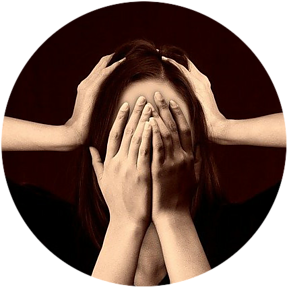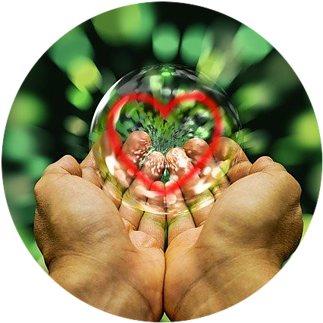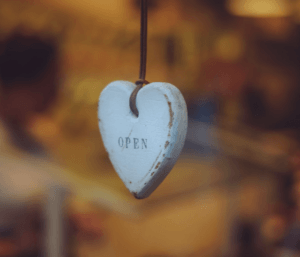Anger is a natural human emotion that most of us never learn to deal with in a healthy way.
And it shows.
War, violence, shootings, screaming matches, revenge schemes, abuse, poking fun at others and bullying, are some common and obvious examples of us not dealing with our anger.
These behaviors are easy to see because they are projected outwardly onto others. They are actions taken and there are usually visible victims.
Many of us don’t associate ourselves with these kinds of behaviors or just write them off as a few immature mistakes we’ve grown from.
But there is another side to anger.
Those of us that learned to hide our anger in order to survive under the radar, probably have turned it inward at ourselves.
We may not even see ourselves as ever experiencing anger.
Have you ever caught yourself saying: “I never get angry,” or “I’m just not an angry person”?
Or my favorite: “Spiritual people don’t get angry.”
Not true.
What this probably means is we’ve become so numb to our own anger and so fearful of it, that we no longer have any boundaries and tend to people-please and self-sacrifice. Then we never have to experience anger from others or ourselves.
It’s a kind of protection.
We all experience anger from time to time.
But some of us have turned our anger into sadness, isolation, shame, and fear. Many say that depression is actually anger turned inward.
Inward Anger
Have you had these thoughts before? 
“No one ever sees or hears me.”
“Something is wrong with me.”
“I’m less important than others.”
“My feelings are wrong.”
“I can’t trust myself or others.”
“It’s not safe to fully be me.”
“I’m not allowed to have my own wants, needs, or feelings but I can probably get some of my needs met by meeting all the needs of others.”
“When I ignore my own needs and boundaries in service of others, I have learned that they will accept me and (possibly) take care of me too.”
If you have any of these beliefs you probably have built up resentment and anger over time. This is because we may expect others to know what we’re feeling or thinking or we expect them to recognize all that we’ve sacrificed and done for them and are waiting for them to repay us or love us in a certain way that we did not verbalize. We never set a boundary and yet we expect them to respect it.
When others don’t hold up the end of the bargain they didn’t even know they were signed up for, there is immense pain and suffering on the part of the people-pleaser who now feels even more inadequate and unloveable.
Or we are angry at ourselves for not measuring up to what our family or society wants us to be. Or we are lost in a sea of chaos and nothing feels like it’s in our control. We feel we have no choice, no freedom, and no peace.
We do have our responsibilities. We have to survive in this toxic system and backward society.
Whatever the source of it, repressed anger doesn’t always come out in ways we expect. But we can always expect it to take an unconscious toll on our relationships and on our own mental and physical health.
We Learned To Devalue Emotions
The vast majority of us have grown up bombarded with the message that feeling and expressing anger is wrong.
It makes us “bad” little girls and boys.
We learned that once we express anger we will lose our connection to the people who we depend on for survival. We learned that we can’t be loved when we are angry. We had to change how we feel, who we are, and distrust our own experience.
Listen to how confusing and painful this was for all of us when we were kids: we had to repress our feelings and needs, and disassociate from ourselves and our sense of reality. We began to distrust ourselves and those we love.
You can see how this would make anyone feel uneasy and unsafe. It puts you on high alert for danger.
It makes you constantly second guess yourself.
Maybe you’re always editing yourself to keep the peace.
This stifles your creativity, clouds your purpose, and leads you to inauthentic choices that aren’t right for you.
Or you went the other extreme.
You learned that to protect yourself you need to stay on top. You need to dominate others before they gain power or control over you. You’ve ruined your relationships with others because you can’t compromise or consider the needs or opinions of others.
Either way, unhealthy manifestations of anger are causing havoc in our lives.
Anger Is Not Bad Or Wrong
Anger itself is not a bad thing.
We tend to categorize emotions into “positive” or “negative” and try to avoid the “bad” feelings at all costs. We may even punish ourselves for feeling them just as we were punished and shamed for them as children.
The “spiritual” or New (C)Age community is also guilty of this. We have fallen prey to toxic positivity where we ignore our unpleasant feelings and pretend to “transcend” them without actually moving through them.
Spiritual bypassing is just a form of gaslighting ourselves and that’s abusive and damaging.
Emotions themselves are neutral.
They are just information. Some may be unpleasant, but that doesn’t mean they are wrong or that they shouldn’t be there.
 They are showing you where your boundaries and values are.
They are showing you where your boundaries and values are.
You may have some false beliefs or thoughts that trigger the emotion, but the emotion itself is never wrong. It’s the thoughts and behaviors, if anything, that we need to change.
Again, emotions are not wrong, but you can have false and toxic thoughts.
Emotions like anger are just letting you know where you stand so that you can change your thoughts, perspective, or take an action to change something.
It is extremely helpful to take your emotional temperature throughout the day. It will reveal not only your current state, but your wants, desires, needs, values, boundaries, expectations, dreams, habits, beliefs, patterns, triggers, negative thought loops, and so much more.
What better way to learn about your Self?
This will give you so much to work with so that you are better equipped to adjust, cope, and heal.
Allowing Anger
The first step in breaking away from this madness is to accept our anger. Or just to accept that we have a hard time feeling our anger or being ok with that emotion.
Bringing more presence to our body sensations and everything in our surrounding environment is a big help.
 Make space a few times during the day to bring your attention to feeling your feet on the ground. The sensation of your breath filling your lungs. Unclench your jaw. Relax your shoulders down. Look at what’s in front of you and then slowly let your eyes move to the next object. Really seeing it. Taking everything in.
Make space a few times during the day to bring your attention to feeling your feet on the ground. The sensation of your breath filling your lungs. Unclench your jaw. Relax your shoulders down. Look at what’s in front of you and then slowly let your eyes move to the next object. Really seeing it. Taking everything in.
Slowly is the key.
Notice what you can see in your peripheral vision. Meaning, focus on what’s in your direct line of sight, and without turning your head or moving your eyes, calmly notice what you can see at the edges of your vision.
Notice your breath again. And sensations in your hands and feet. Does your body have contact with a chair or a glass of water? Feel it.
Noticing and allowing whatever is happening within the body and in the immediate environment can be very calming. But it also opens us to experience the Now.
When you are in this state it becomes easier to notice any emotion, thought, or sensation. When this becomes a practice we begin to develop greater compassion for ourselves and more space will open within to allow for the healthy and conscious experiencing and expression of unpleasant emotions such as anger.
Once we feel our anger fully and hold it, we can ask why it has come to us and what it needs. This way we can respond from a grounded and centered place, rather than react out of pain, causing more pain in turn.
Develop a relationship to your anger and to each of your emotions. Stay curious and welcome them in for some attention and a talk. Be with them as you would a little kid throwing a tantrum. Be who you needed when you were a little kid in the middle of a tantrum. Think of how you would have responded if the adult stayed calm, got down to your level, and let you express yourself. What if they then helped you to regulate your nervous system and come up with a solution? Or just comfort?
Instead, you were most likely punished, screamed at, physically reprimanded, or ignored. This is very damaging and we need not do this to ourselves.
Become the parent you needed.
Allow your anger to be. To inform you. The wisdom you uncover underneath will reward you with a life more aligned with your true Self.

Do you allow yourself space for anger to rise up? How do you usually find yourself expressing anger? How does it manifest in your life? If you often repress anger, how do you think this has held you back in life? What can you do to better serve your Self when you are experiencing unpleasant emotions like anger?
<3
Nicole


I have always loved articles that talk about feelings, and I enjoyed this so much and I could relate to this because I was always alone as a kid add and this made me relate with this article very well. Thank you so much for this,. I really look forward to seeing more articles like this
Thanks, Collins22. I’m hoping that it becomes more mainstream for people to learn more about emotions, mental health, and the nervous system as all of these things affect our physical health, relationships, and finances as well. Stick around because there’s more to come!
I never thought about having anger pointed inward. There was a time period where I felt stuck in being angry- and it was manifesting in different ways. Felt like I wasn’t going to come out of it. I took time to truly reflect to better understand where it was coming from. Once I had it identified, I took full accountability and I started feeling better. Anger is one of those emotions that can be difficult to put a finger on. You do an excellent job of explaining how it’s manifested.
That’s amazing that you were able to come to a clear awareness of yourself and your situation. Not many people take the time to reflect and process difficult emotions. I’m glad you were able to take responsibility, let the anger come out in a healthy way, and get unstuck. Thanks for commenting!